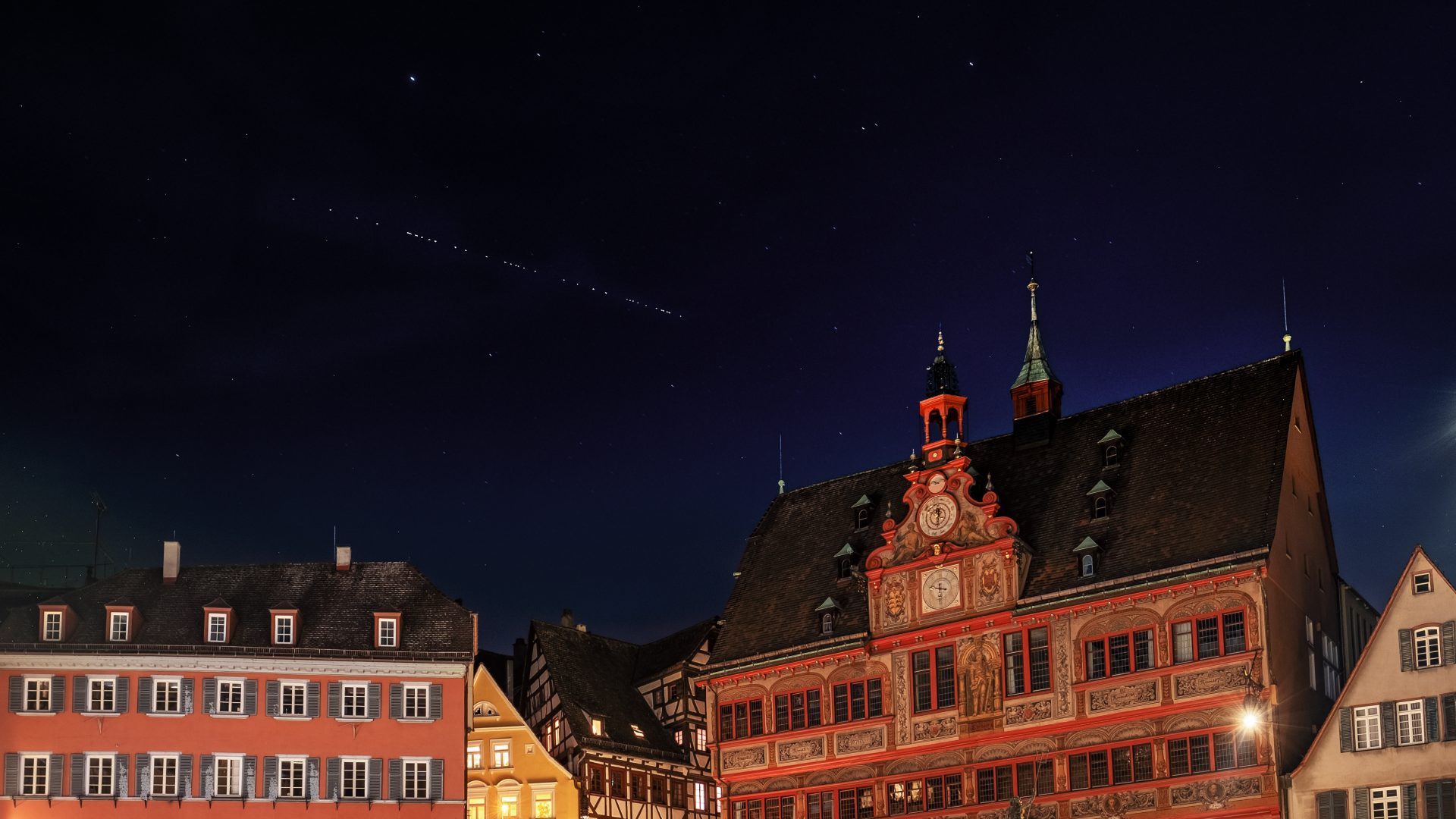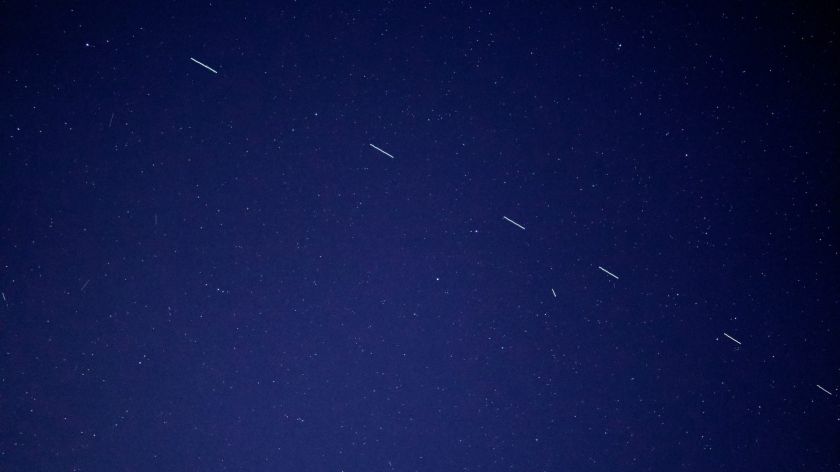Elon Musk’s ‘Christmas lights’ are getting in the way of astronomers
-
Foto: Forest Katsch via unsplash
Thanks to Elon Musk’s Starlink satellites, you can access the internet in the middle of the ocean. However, the artificial satellites passing by are increasingly becoming an issue for astronomers: the satellites disrupt images and data collected from space.
It looks a little bit like a nightly alien invasion. A train of little white cars, sometimes thirty in a row, high up in the sky. These are Elon Musk’s Starlink satellites, shimmering with reflected sunlight, like the moon. Musk hopes that, through Starlink, the internet will be available and affordable everywhere on Earth – from the Sahara to the middle of the Pacific. Similar to the worldwide availability of GPS.
However, while the goal sounds very noble (although Elon Musk’s sincerity is a frequent point of contention), Starlink is creating more and more issues for astronomers. All those dots buzzing around disrupt telescope recordings, including those taken by researchers in Nijmegen.
Alarm raised
The electronics in the satellites send out all kinds of radio signals, explains radio astronomer Marc Klein Wolt in the beta faculty’s Gigabyte cafeteria. These signals interfere with those from the beginning of the universe that he and his colleagues are very interested in. ‘The new Square Kilometer Array (SKA, a telescope in the southern hemisphere, eds.) is especially affected by this issue. Its construction cost billions.’
‘If we’re unlucky, those stripes mask the collision of two neutron stars’
Last year, several radio astronomers, including Cees Bassa with the ASTRON-Institute in Drenthe, raised the alarm on this issue in the journal Astronomy & Astrophysics. Of the 68 Starlink satellites tested, 47 caused interference in SKA readings.
Klein Wolt has similar concerns about a project he is developing on the far side of the moon. The astronomer hopes to put down a radio antenna as part of a NASA mission in two to four years. That instrument will be able to look further into the past than the SKA, which is untrodden scientific ground. ‘The far side of the moon is the only place in our solar system quiet enough because the moon stops radio signals coming from Earth. I would love to turn it into a scientific reserve, with similar protections as nature reserves.’
Spotting supernovas with an app
Not too long ago, BlackGEM got its very own app: Black Hole Finder, which anyone can use to help with astronomical research in Nijmegen. Steven Bloemen: ‘Our research compares older and more recent photos, which is a lot of work. People can help by using the app to report differences between images.’ A difference between pictures, like a new point of light, may be of scientific interest; it may indicate a supernova (a star exploding), stars colliding, or unknown asteroids (space rocks). Or Musk’s damned satellites, of course.
But the Americans and other powers want to put down bases on the moon in the long term, not only to research our cosmic neighbour but also as a pitstop on the way to Mars. When that happens, the quietness will vanish. Bases like that need all sorts of electronics and communications satellites. In fact, Nokia already has plans for a 4G network on the moon.
Colliding black holes
And it’s not just radio telescopes that are being affected: stargazers that take ‘normal’ pictures of the night sky, such as BlackGEM, are also disrupted by the satellites, according to astronomer Steven Bloemen at the Huygens building. BlackGEM is one of three brand-new telescopes in Chile that are used to track colliding black holes and neutron stars, among other things. Radboud University is one of the leading institutions of the project, with professor Paul Groot as the lead researcher and Bloemen as the project’s manager.

‘Do you see those two stripes in the picture?’ Bloemen points to a BlackGEM recording of the night sky on his computer. ‘Those are the light trails of satellites. If we’re unlucky, those stripes mask the collision of two neutron stars; we won’t be able to record it.’
It’s like trying to take pictures of clouds in between the vapor trails of airplanes screeching past. BlackGEM’s telescopes look at a fairly large part of the sky – roughly ten times the size of the moon. Because of that, they are much more affected by the satellites than other telescopes that only look at a small part of the firmament. However, because the latter are often very sensitive to light, their recordings can be blinded by passing Starlink satellites.
‘China and Russia want to launch their own systems’
‘We are in the process of identifying satellite traces in every photo, manually and through using software,’ Bloemen explains (see insert). ‘Those parts of the images are unusable for our research. Fortunately, these are small portions for now, but as more and more satellites are launched, the holes in the pictures will expand.’
Starlink already has roughly 5000 satellites orbiting the Earth; almost half the total of earth satellites currently in use. By some estimates, there could be as many as 100.000 in 2030. Bloemen: ‘Ukraine is using the Starlink network in the war effort. Those satellites have become geopolitically important, which is why countries like China and Russia want to launch their own systems. That will make things very difficult for astronomers.’
Christmas lights
Fortunately, there are possible solutions. The International Astronomical Union IAU has contacted various satellite companies to make them aware of the dangers. ‘ Space electronics manufacturers can take scientists’ interests into account, going forward,’ says Klein Wolt. ‘For example, they can shield their chips to prevent them from interfering with our work.’
‘The sky is a part of nature. And that part is increasingly under pressure’
Bloemen adds: ‘They could also make satellites darker so that they reflect less sunlight.’ But whether someone like Elon Musk or countries like China will take that advice to heart, is another matter entirely.
But even more than the scientific challenges, the tsunami of satellites is more of an issue for humanity in general, according to Klein Wolt. ‘The sky is an extension of our environment; it is, essentially, a part of nature. And that part is increasingly under pressure. By looking upwards and outwards, we realise we are a part of the Milky Way, something of a magnitude much larger than our tiny planet. That spell will be broken if the sky is filled with Musk’s Christmas lights.’
Translated by Jasper Pesch





